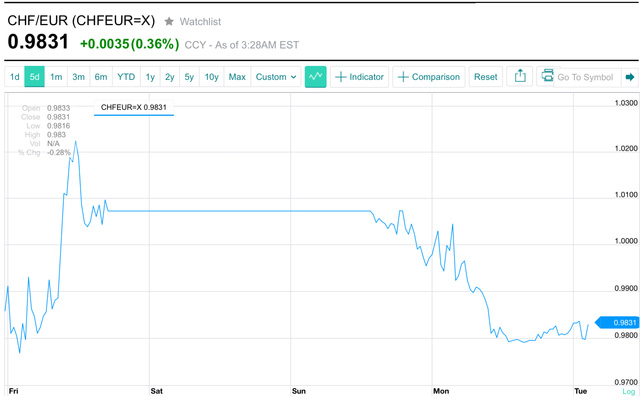This colloquial phrase is used when something is considered impossible. That seems to be the case with the Swiss franc, which saw a major appreciation when the Swiss National Bank (SNB) announced it was floating its currency. It is an excellent example for one type of exchange rate.
For obvious reasons, Switzerland is a major recipient of foreign investment. In the currency markets, over the past few decades, capital prevails over goods, at least in the short term. And capital inflows in Switzerland have been particularly high for years, especially due to the weakened euro, the low interest rates by the European Central Bank (ECB) is promoting, and the prospect that those interest rates will remain low for a long time, especially after the announced/anticipated purchase of government bonds by the ECB, which will (and already does) cause a depreciation of the euro and therefore an appreciation of the Swiss franc, further compounding their problems.

Thus, for some time now, the Swiss franc has been subject to strong pressure towards appreciation: demand exceeds supply. But Switzerland is an exporting country, and its economy is not so buoyant that it can afford to lose competitiveness. Given that, since September 2011 the SNB actively intervenes in markets to prevent its exchange rate vs. the euro from appreciating, imposing a limit of 1.20 Swiss francs to 1 euro. To that end, the SNB buys foreign currency (euros, dollars) and sells francs, which has driven up the balance considerably. Another step taken yesterday was to set a negative interest rate (-0.75%) on bank deposits, to discourage capital inflows.
But foreign investors don’t put their money in Switzerland in search of profits, but rather security, so the negative compensation will not discourage them. The buying pressure on the Swiss franc is not being reduced. And the SNB continues to stockpile euros.
Currency intervention is recommended when a country has a tendency toward appreciation during a limited period of time; for example, if the country’s currency becomes a safe haven in the face of a conflict in a neighboring country that may last a few weeks or months. But we clearly see that the appetite for the Swiss franc is not a passing fad. So, intervention may be useful to buy some time and implement measures to curb the buying pressure. But, of course, if the problem lasts more than four years — and it is not expected to change in the short term — then intervention is ultimately impossible. It ain’t gonna happen.
Sorry, Swiss exporters. But perhaps we ought to look at things in a different light: Swiss exporters have enjoyed a few years of artificially undervalued currency, resulting from the SNB intervention. What’s happening right now is a misfortune, or a tsunami, as one exporter called it. But this misfortune was heralded. Okay, I get it: What would an exporter do if they realized their competitive advantage was going to disappear: Change their product? Change their strategy? Compete differently? Chances are, they would cross their fingers, wait for a miracle, and ask their central bank not to let the currency appreciate.


